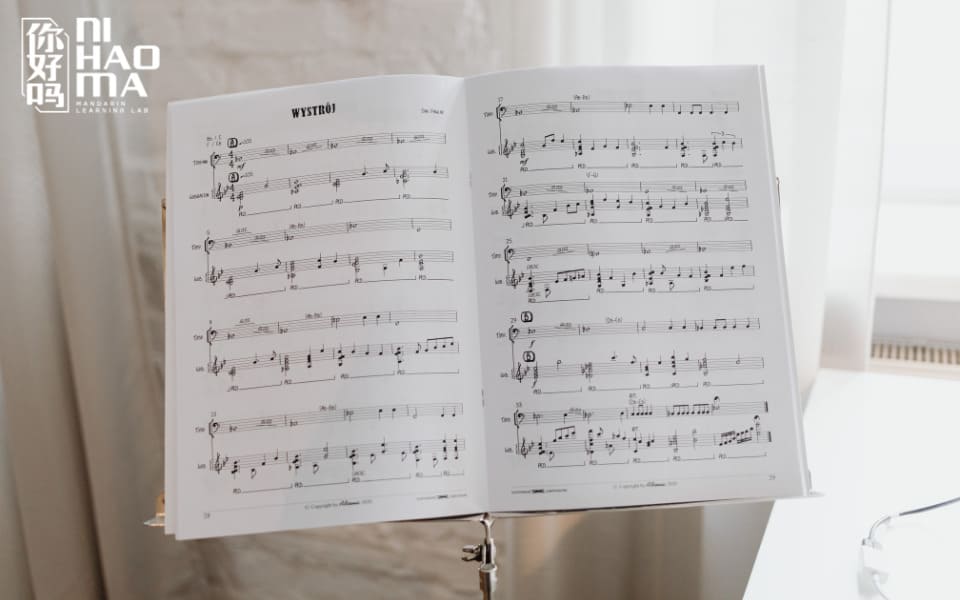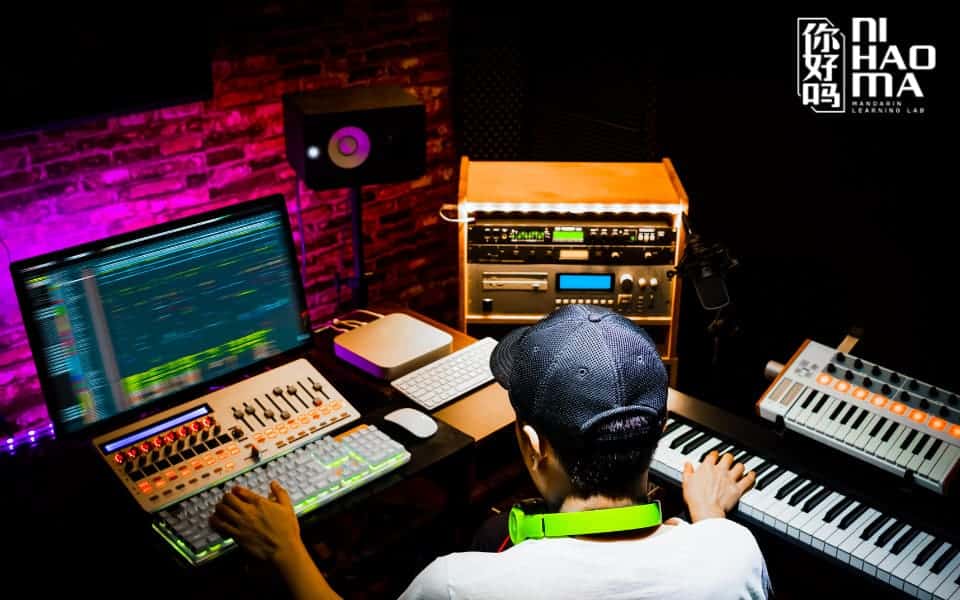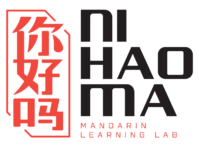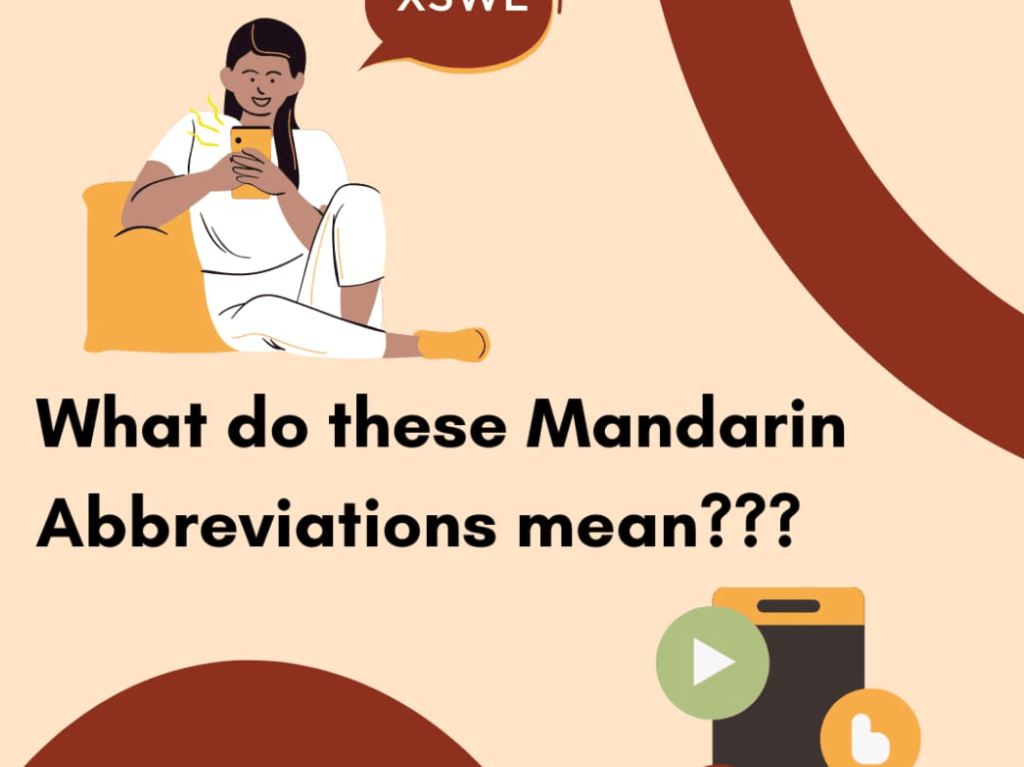Music is a universal language that connects people beyond borders and cultural differences. For learners who already have a basic foundation in Mandarin, expanding your vocabulary into more interesting and specific topics – such as music – can help make your communication more natural and engaging. In this article, Ni Hao Ma will introduce you to the most common vocabulary about music in Chinese, along with helpful examples for everyday conversation.
Vocabulary About Music in Chinese
If you love music and are currently learning Mandarin, exploring music-related vocabulary can make studying more enjoyable and help boost your confidence when expressing your interests in Chinese.
Vocabulary About Music Genres in Chinese
| Chinese | Pinyin | Meaning |
|---|---|---|
| 音乐 | yīnyuè | Music |
| 流行音乐 | liúxíng yīnyuè | Pop music |
| 古典音乐 | gǔdiǎn yīnyuè | Classical music |
| 室内乐 | shìnèi yuè | Chamber music |
| 抒情歌曲 | shūqíng gēqǔ | Ballad / Sentimental music |
| 古风歌曲 | gǔfēng gēqǔ | Traditional-style Chinese modern music |
| 摇滚音乐 | yáogǔn yīnyuè | Rock music |
| 说唱 | shuōchàng | Rap |
| 朋克音乐 | péngkè yīnyuè | Punk music |
| 金属乐 | jīnshǔyuè | Metal music |
| 节奏布鲁斯 | jiézòu bùlǔsī | R&B |
| 嘻哈 | xīhā | Hip-hop |
| 爵士乐 | juéshì yuè | Jazz |
| 灵魂乐 | línghún yuè | Soul music |
| 电子音乐 | diànzǐ yīnyuè | Electronic music (EDM) |
| 不插电音乐 | bù chādiàn yīnyuè | Acoustic music |
| 独立音乐 | dúlì yīnyuè | Indie music |
| 浩室音乐 | hàoshì yīnyuè | House music |
| 民谣 | mínyáo | Folk music |
| 雷鬼乐 | léiguǐyuè | Reggae |
| 乡村音乐 | xiāngcūn yīnyuè | Country music |
| 歌剧 | gējù | Opera |
| 交响乐 | jiāoxiǎngyuè | Symphony music |
| 纯音乐 / 器乐 | chún yīnyuè / qìyuè | Instrumental music (no lyrics) |
Vocabulary About Music Theory in Chinese
If you’re studying music or fascinated by Chinese musical culture, learning music theory terms in Mandarin will be extremely useful. Here are some commonly used terms related to musical notation and structure:
| Chinese | Pinyin | Meaning |
|---|---|---|
| 乐理 | yuèlǐ | Music theory |
| 乐谱 | yuèpǔ | Sheet music / Score |
| 五线谱 | wǔxiànpǔ | Staff (music staff) |
| 音符 | yīnfú | Musical note |
| 谱号 | pǔhào | Clef |
| 高音谱号 | gāoyīn pǔhào | Treble Clef (G Clef) |
| 低音谱号 | dīyīn pǔhào | Bass Clef (F Clef) |
| 全音符 | quán yīnfú | Whole note |
| 二分音符 | èrfēn yīnfú | Half note |
| 四分音符 | sìfēn yīnfú | Quarter note |
| 八分音符 | bāfēn yīnfú | Eighth note |
| 休止符 | xiūzhǐfú | Rest |
| 节奏 | jiézòu | Rhythm |
| 拍号 | pāihào | Time signature |
| 小节 | xiǎojié | Measure / Bar |
| 附点 | fùdiǎn | Dotted note |
| 和弦 | héxián | Chord |
| 旋律 | xuánlǜ | Melody |
| 调性 | diàoxìng | Key / Tonality |
| 音阶 | yīnjiē | Scale |
| 全音 | quányīn | Whole tone |
| 半音 | bànyīn | Semitone |
| 音程 | yīnchéng | Interval |
| 大调 | dàdiào | Major key |
| 小调 | xiǎodiào | Minor key |
| 升号 | shēnghào | Sharp (#) |
| 降号 | jiànghào | Flat (b) |
| 还原号 | huányuánhào | Natural (♮) |
| 速度 | sùdù | Tempo |
| 强弱 | qiángruò | Dynamics |
| 渐强 | jiànqiáng | Crescendo |
| 渐弱 | jiànruò | Decrescendo |
| 八度 | bādù | Octave |
| 歌词 | gēcí | Lyrics |
| 和声 | héshēng | Harmony |
| 转调 | zhuǎndiào | Modulation / Key change |

| Chinese | Pinyin | Meaning |
|---|---|---|
| 主歌 | zhǔgē | Verse (main lyric section) |
| 副歌 | fùgē | Chorus (refrain) |
| 间奏 | jiànzòu | Interlude |
| 前奏 | qiánzòu | Intro |
| 尾奏 | wěizòu | Outro |
| 过渡段 | guòdù duàn | Transition section |
| 副段 / 桥段 | qiáoduàn | Bridge |
| 结束式 | jiéshùshì | Ending cadence |
| 独唱 | dúchàng | Solo (solo vocal singing) |
| 伴唱 | bànchàng | Backing vocals |
| 编曲 | biānqǔ | Arrangement (instrumentation / orchestration) |
| 主音 | zhǔyīn | Tonic |
| 属音 | shǔyīn | Dominant |
| 下主音 | xiàzhǔyīn | Subdominant |
| 低音 | dīyīn | Low pitch |
| 中音 | zhōngyīn | Mid-range pitch |
| 高音 | gāoyīn | High pitch |
| 女高音 | nǚ gāoyīn | Soprano |
| 女中音 | nǚ zhōngyīn | Mezzo-soprano |
| 女低音 | nǚ dīyīn | Alto / Contralto |
| 男高音 | nán gāoyīn | Tenor |
| 男中音 | nán zhōngyīn | Baritone |
| 男低音 | nán dīyīn | Bass |
Vocabulary About Music in Chinese – Musical Instruments
Ever wondered how to say guitar or violin in Chinese? Below is a helpful list of musical instrument terminology:
| Chinese | Pinyin | Meaning |
|---|---|---|
| 乐器 | yuèqì | Musical instrument |
| 弦乐器 | xiányuèqì | String instruments |
| 吉他 | jítā | Guitar |
| 电吉他 | diàn jítā | Electric guitar |
| 低音吉他 | dīyīn jítā | Bass guitar |
| 尤克里里 | yóu kè lǐ lǐ | Ukulele |
| 小提琴 | xiǎotíqín | Violin |
| 大提琴 | dàtíqín | Cello |
| 低音提琴 | dīyīn tíqín | Double bass |
| 竖琴 | shùqín | Harp |
| 键盘乐器 | jiànpán yuèqì | Keyboard instruments |
| 钢琴 | gāngqín | Piano |
| 风琴 | fēngqín | Organ |
| 电子琴 | diànzǐqín | Electronic keyboard |
| 手风琴 | shǒufēngqín | Accordion |
| 管乐器 | guǎnyuèqì | Wind instruments |
| 长笛 | chángdí | Flute |
| 单簧管 | dānhuángguǎn | Clarinet |
| 萨克斯风 | sàkèsīfēng | Saxophone |
| 小号 | xiǎohào | Trumpet |
| 长号 | chánghào | Trombone |
| 口琴 | kǒuqín | Harmonica |
| 打击乐器 | dǎjī yuèqì | Percussion instruments |
| 鼓 | gǔ | Drum |
| 架子鼓 | jiàzǐgǔ | Drum set |
| 钹 | bó | Cymbals |
| 二胡 | èrhú | Erhu (Chinese two-string fiddle) |
| 琵琶 | pípá | Pipa (Chinese lute) |
| 古筝 | gǔzhēng | Guzheng (Chinese zither) |
| 月琴 | yuèqín | Moon lute |
| 笛子 | dízi | Bamboo flute |
| 萧 | xiāo | Xiao (end-blown flute) |
| 独弦琴 | dúxiánqín | Monochord (Vietnamese Đàn Bầu) |

Vocabulary Describing Emotions
When listening to music, you may sometimes want to describe the emotions of a song but struggle to find the right words in Mandarin. Emotional vocabulary in Chinese is rich and expressive. Understanding how to use these words will help you share your feelings, analyze lyrics, and discuss music in a more meaningful way.
| Chinese | Pinyin | Meaning |
|---|---|---|
| 感动 | gǎn dòng | Moved, touched emotionally |
| 动人 | dòng rén | Heartwarming / touching |
| 悲伤 | bēi shāng | Sad, sorrowful |
| 伤感 | shāng gǎn | Melancholic, emotional sadness |
| 沉重 | chén zhòng | Heavy, somber |
| 惆怅 | chóu chàng | Nostalgic sadness, wistful |
| 怀旧 | huái jiù | Nostalgic |
| 愉快 | yú kuài | Cheerful |
| 激昂 | jī áng | Passionate, uplifting |
| 深情 | shēn qíng | Deeply emotional, affectionate |
| 柔和 | róu hé | Soft, gentle |
| 甜美 | tián měi | Sweet and pleasant |
| 孤独 | gū dú | Lonely |
| 坚强 | jiān qiáng | Strong, resilient |
| 明亮 | míng liàng | Bright |
| 雄壮 | xióng zhuàng | Powerful, majestic |
Vocabulary About Music Production in Chinese
| Chinese | Pinyin | Meaning |
|---|---|---|
| 创作 | chuàngzuò | To compose / create |
| 作曲 | zuòqǔ | To write music |
| 作词 | zuòcí | To write lyrics |
| 编曲 | biānqǔ | Arrangement / orchestration |
| 制作人 | zhìzuòrén | Music producer |
| 录音 | lùyīn | Recording |
| 录音棚 | lùyīnpéng | Recording studio |
| 混音 | hùnyīn | Mixing |
| 母带处理 | mǔdài chǔlǐ | Mastering |
| 效果器 | xiàoguǒqì | Effects unit |
| 均衡器 | jūnhéngqì | Equalizer (EQ) |
| 压缩器 | yāsuōqì | Compressor |
| 混响 | hùnxiǎng | Reverb |
| 延迟 | yánchí | Delay |
| 采样 | cǎiyàng | Sampling |
| 音轨 | yīnguǐ | Audio track |
| 节拍器 | jiépāiqì | Metronome |
| 监听音箱 | jiāntīng yīnxiāng | Studio monitor speakers |
| 和声 | héshēng | Harmony |
| 旋律 | xuánlǜ | Melody |
| 节奏 | jiézòu | Rhythm |
| 主唱 | zhǔchàng | Lead vocal |
| 歌手 | gēshǒu | Singer |
| 录制 | lùzhì | To record (audio/video) |
| 版权 | bǎnquán | Copyright |

Common Chinese Conversation Patterns About Music
Many Mandarin learners focus mainly on vocabulary and grammar, but sometimes forget that the ultimate goal is communication. Music is an easy and engaging topic to talk about, suitable for both beginners and advanced learners. Below are some useful sentence patterns related to music that will help you speak more naturally and confidently in daily conversation.
| Chinese | Pinyin | Meaning |
|---|---|---|
| 你喜欢听什么音乐? | Nǐ xǐhuān tīng shénme yīnyuè? | What kind of music do you like to listen to? |
| 我最喜欢流行音乐/摇滚乐。 | Wǒ zuì xǐhuān liúxíng yīnyuè/yáogǔn yuè. | I like pop/rock music the most. |
| 这首歌的节奏很动感。 | Zhè shǒu gē de jiézòu hěn dònggǎn. | The rhythm of this song is very catchy/energetic. |
| 你会弹奏乐器吗? | Nǐ huì tánzòu yuèqì ma? | Can you play any musical instruments? |
| 我正在学弹钢琴/吉他。 | Wǒ zhèngzài xué tán gāngqín/jítā. | I’m learning to play the piano/guitar. |
| 你的偶像是谁? | Nǐ de ǒuxiàng shì shuí? | Who is your favorite idol/artist? |
| 他/她的歌声很感人。 | Tā/tā de gēshēng hěn gǎnrén. | His/Her singing voice is very touching. |
| 这首歌词写得很美。 | Zhè shǒu gēcí xiě dé hěn měi. | The lyrics of this song are beautifully written. |
| 这部电影的配乐很棒。 | Zhè bù diànyǐng de pèiyuè hěn bàng. | The soundtrack of this movie is excellent. |
| 你听过这支乐队吗? | Nǐ tīngguo zhè zhī yuèduì ma? | Have you listened to this band before? |
| 我想去听一场音乐会。 | Wǒ xiǎng qù tīng yī chǎng yīnyuèhuì. | I want to go to a concert. |
| 你唱歌唱得真好听! | Nǐ chànggē chàng dé zhēn hǎotīng! | You sing so well! |
| 这首歌让我感到放松。 | Zhè shǒu gē ràng wǒ gǎndào fàngsōng. | This song makes me feel relaxed. |
| 哪个音乐平台你常用? | Nǎge yīnyuè píngtái nǐ cháng yòng? | Which music platform do you usually use? |
| 我最喜欢音乐剧。 | Wǒ zuì xǐhuān yīnyuèjù. | I like musicals the most. |

Sample dialogues about music in Chinese
A: 你有没有特别崇拜的艺术家?
Nǐ yǒu méiyǒu tèbié chóngbài de yìshùjiā?
Do you have any artists you especially admire?
B: 有,我最喜欢的艺术家是邓紫棋。你知道她吗?
Yǒu, wǒ zuì xǐhuān de yìshùjiā shì Dèng Zǐqí. Nǐ zhīdào tā ma?
Yes, my favorite artist is G.E.M. Do you know her?
A: 当然知道!她的嗓音很有力量,而且情感很真挚。
Dāngrán zhīdào! Tā de sǎngyīn hěn yǒu lìliàng, érqiě qínggǎn hěn zhēnzhì.
Of course! Her voice is powerful, and her emotional expression is very genuine.
B: 对,我就是因为她的现场演唱而喜欢上她的。每一首歌都很震撼。
Duì, wǒ jiùshì yīnwèi tā de xiànchǎng yǎnchàng ér xǐhuān shàng tā de. Měi yìshǒu gē dōu hěn zhènhàn.
Exactly. I became a fan because of her live performances. Every song is so impactful.
A: 她写歌的能力也很强吧?
Tā xiěgē de nénglì yě hěn qiáng ba?
She’s also strong in songwriting, right?
B: 是的,她自己作词作曲,而且歌词很有深度。
Shì de, tā zìjǐ zuòcí zuòqǔ, érqiě gēcí hěn yǒu shēndù.
Yes, she writes both her music and lyrics, and her songs have great depth.
A: 你最喜欢她的哪一首歌?
Nǐ zuì xǐhuān tā de nǎ yìshǒu gē?
Which of her songs do you like best?
B: 我最喜欢《光年之外》,每次听都很感动。
Wǒ zuì xǐhuān “Guāngnián zhīwài”, měi cì tīng dōu hěn gǎndòng.
I like “Light Years Away” the most. I feel moved every time I listen.
Final Thoughts
Music is a wonderful bridge that helps us express emotions and connect with others. Expanding your vocabulary about music in Chinese not only increases your language skills but also makes conversations about personal interests more meaningful. Ni Hao Ma hope this guide has been helpful and be sure to stay tuned for more enjoyable and practical lessons ahead!



